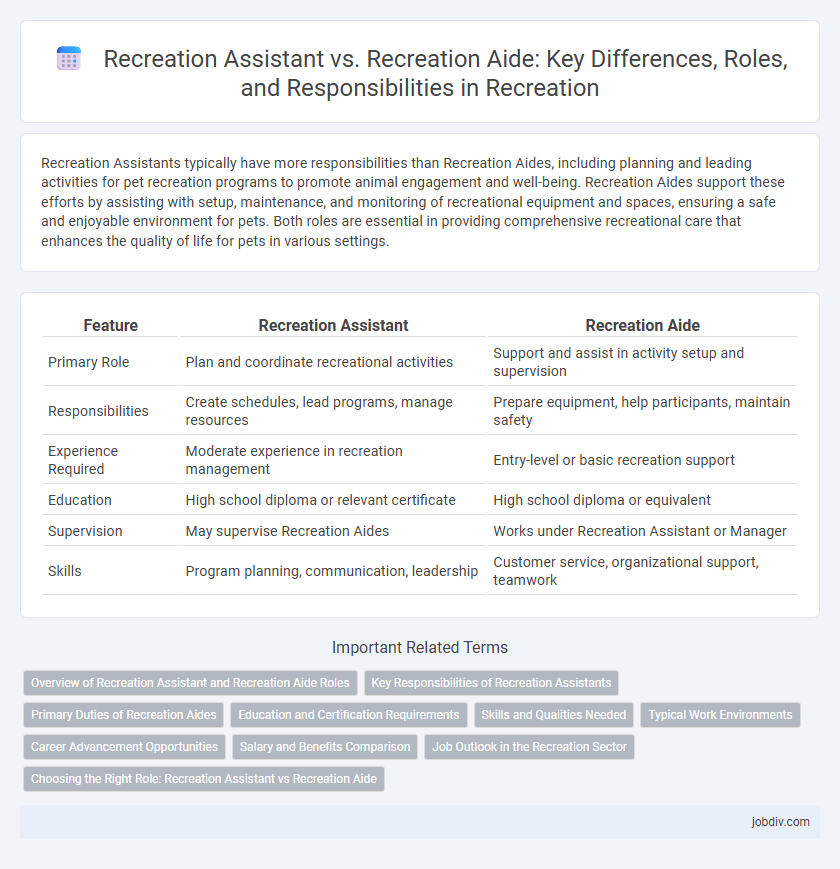Recreation Assistants typically have more responsibilities than Recreation Aides, including planning and leading activities for pet recreation programs to promote animal engagement and well-being. Recreation Aides support these efforts by assisting with setup, maintenance, and monitoring of recreational equipment and spaces, ensuring a safe and enjoyable environment for pets. Both roles are essential in providing comprehensive recreational care that enhances the quality of life for pets in various settings.
Table of Comparison
| Feature | Recreation Assistant | Recreation Aide |
|---|---|---|
| Primary Role | Plan and coordinate recreational activities | Support and assist in activity setup and supervision |
| Responsibilities | Create schedules, lead programs, manage resources | Prepare equipment, help participants, maintain safety |
| Experience Required | Moderate experience in recreation management | Entry-level or basic recreation support |
| Education | High school diploma or relevant certificate | High school diploma or equivalent |
| Supervision | May supervise Recreation Aides | Works under Recreation Assistant or Manager |
| Skills | Program planning, communication, leadership | Customer service, organizational support, teamwork |
Overview of Recreation Assistant and Recreation Aide Roles
Recreation Assistants support the planning and implementation of organized activities in community centers, parks, and recreational facilities, ensuring participant safety and engagement. Recreation Aides perform more entry-level tasks such as setting up equipment, maintaining facility cleanliness, and assisting supervisors with basic activity coordination. Both roles are essential in promoting community wellness and delivering a positive recreational experience.
Key Responsibilities of Recreation Assistants
Recreation Assistants coordinate and lead organized activities, ensuring safety and engagement for participants of all ages in community centers, parks, and recreational facilities. They develop program schedules, provide instructional guidance, and manage equipment to support diverse recreational events. These professionals also evaluate participant feedback to enhance program effectiveness and promote inclusive, accessible recreation opportunities.
Primary Duties of Recreation Aides
Recreation Aides primarily support recreational programs by assisting participants with activities, setting up equipment, and maintaining a safe environment. They often handle clerical tasks, monitor participant behavior, and provide direct supervision during events or outings. These duties ensure smooth operation and enhance participant enjoyment within community centers, parks, or recreational facilities.
Education and Certification Requirements
Recreation Assistants typically require a high school diploma or equivalent, with some positions favoring candidates who have completed college-level courses in recreation, leisure studies, or related fields, while Recreation Aides often need only a high school diploma or GED. Certification is not always mandatory for either role, but possessing CPR, First Aid, or other relevant certifications can enhance employability and performance in both positions. Higher education and specialized certifications generally enable Recreation Assistants to take on more responsibilities and leadership roles compared to Recreation Aides.
Skills and Qualities Needed
Recreation Assistants require strong organizational skills, effective communication, and the ability to plan and lead activities to ensure participant engagement and safety. Recreation Aides must exhibit attention to detail, physical stamina, and a supportive attitude to assist with setup, equipment maintenance, and participant supervision. Both roles demand interpersonal skills, flexibility, and a passion for promoting wellness through recreational programs.
Typical Work Environments
Recreation Assistants typically work in community centers, parks, and leisure facilities, facilitating programs and ensuring participant safety. Recreation Aides are often found in schools, nursing homes, and public recreation departments, supporting lead staff and handling equipment or setup tasks. Both roles thrive in environments that promote physical activity, social interaction, and community engagement.
Career Advancement Opportunities
Recreation Assistants often have greater career advancement opportunities compared to Recreation Aides due to their higher level of responsibilities, including program planning and coordination. Many Recreation Assistants can progress to supervisory or management roles within community centers, parks, and recreational organizations by gaining certifications or relevant experience. In contrast, Recreation Aides typically perform entry-level support tasks with limited pathways for promotion without further education or training.
Salary and Benefits Comparison
Recreation Assistants typically earn higher salaries than Recreation Aides, with averages ranging from $30,000 to $40,000 annually compared to $25,000 to $32,000 for aides, reflecting differences in job responsibilities and qualifications. Benefits for both positions often include health insurance, retirement plans, and paid time off, but Recreation Assistants may receive enhanced benefits or additional incentives due to their supervisory roles. Salary and benefits packages vary by location, employer, and experience, making it essential to review specific job offers for accurate comparisons.
Job Outlook in the Recreation Sector
Recreation Assistants typically experience steady job growth driven by increasing demand for community and wellness programs, with a projected employment increase of around 10% over the next decade. Recreation Aides face competitive opportunities but benefit from expanding public and private recreational facilities, contributing to moderate job prospects. Both roles are essential in supporting recreational activities, yet Recreation Assistants often have more responsibilities and higher earning potential, impacting their overall job outlook positively.
Choosing the Right Role: Recreation Assistant vs Recreation Aide
Choosing the right role between a Recreation Assistant and a Recreation Aide depends on the level of responsibility and required skills; Recreation Assistants typically handle program planning and coordination, while Recreation Aides focus on supporting activities and assisting participants. Recreation Assistants often require more experience and formal education, such as certifications in recreational therapy or event management, whereas Recreation Aides may need basic training and on-the-job experience. Understanding the specific job descriptions and career goals will help determine the most suitable position in the recreation field.
Recreation Assistant vs Recreation Aide Infographic

 jobdiv.com
jobdiv.com